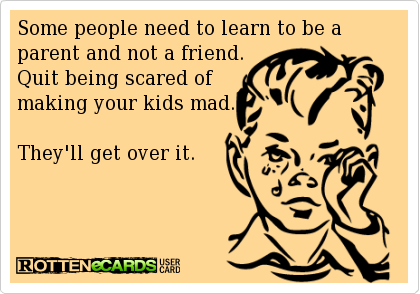I ran across this e-card on social media:
Maybe… But I also think it’s more complicated than that. Our job as parents is to teach our kids how to be adults. So in every experience, we should be looking for the learning opportunity and how to make it real to our kids.
But upsetting them needlessly, or—what is worse—treating them to our own fear and anger, is unlikely to prompt them to internalize the constructive wisdom they’ll need those few years hence, when they accept complete responsibility and control for their own lives.
And this has nothing to do with being afraid your kids will hate you. Out of all the people I know, I don’t know any parents who seem to be afraid their kids won’t like them.
And that’s also not the same as making them mad, because it’s possible to be mad at someone and still have a close relationship with them. And I imagine most parents understand this, because how often are we mad at our kids?
Mostly, the dysfunctions I observe with parents and their children—or at least the phenomena that scare me—revolve around parents who can’t trust their kids, and kids who can’t be honest with their parents. If anything, I would think this more likely the result of not being afraid enough of upsetting one’s kids (whether by making them mad, or sad, or just plain disillusioned), and neglecting to balance these negative feelings with a healthy dose of positive love-activity.
(Although I have little evidence for this idea in practice, aside from my own experiences.)
This terrifies me as a father, because sadly, some kids don’t “get over it.”
So as I said, I think it’s more complicated than that.
-TimK

Kids accept reality. So, discipline needs to be real not outbursts of anger and certainly not laced with abusive comments and actions. Discipline is not avenging but retributive. Kids want to be corrected in love. The fringe benefit of their learning the value of discipline—and that spells self-discipline as an adult—is the respect they will serve up to such a loving parent.
Love the article!!!!